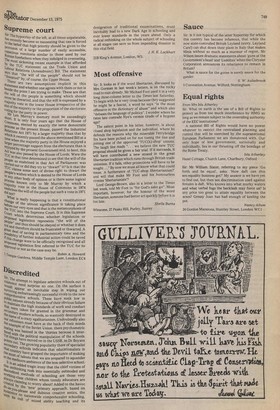Supreme court
Sir: The hypocrisy of the left, at all times unpalatable, eas recently become so nauseating that one is forced to the belief that high priority should be given to the provision of a large number of easily accessible, caPacious vomitoria similar to those used by our Roman forefathers when they indulged in overeating. The most sickening recent example is that afforded by the TUC statement on the Trade Union and Labour Relations (Amendment) Bill. The statement ,saYs that "the will of the people" should not be 'thwarted" by, of course, the Upper House. Them are two assumptions implicit in this statement and whether one agrees with them or not is beside the point I am trying to make. These are that the Will of the people is something which should never be thwarted, and that the will is expressed by a li:lai°ritY vote in the lower House irrespective of the s!ze of the majority or the proportion of the electorate Voting for the party in power. hrOftLen Murray's memory must be exceedingly It is only four years ago that the House of "intnons, elected by exactly the same democratic Process as the present House, passed the Industrial elations Act 1971 by a larger majority than that by Which it recently passed the above mentioned Bill at a time when the majority party in the House enjoyed a larger Percentage support from the electorate than is eZoyed by the present Government and, to boot, this was also passed by the House of Lords. Were the LiC at that time determined to see that the will of the lx°Ple as enshrined in that Act of Parliament was c.ra.,tried out or did they try to "thwart" it? Is it that the 1C claims some sort of divine right to thwart the People's wishes which is denied to the House of Lords O r any other body of opinion or is there some logical \tnilr°c, ess known only to Mr Murray by which a vote in the House of Commons in 1974 userines the will of the people but such a vote in 1971 did not?
Pat is really happening is that a constitutional ange of the utmost significance is taking place t't;ore our very eyes and that is the metamorphosis of c,7 TUC into the Supreme Court, It is this Supreme proutirt which determines whether legislation or 0°sed legislation represents "the will of the .700tPle" arid thus should be obeyed or whether it does nre and therefore should be frustrated or thwarted. A g at deal
Possibilitf saved Y further industrial action could be
131.
"b Chan o ge were to be officially recognised and all
°Posed I • appr , eglslation first referred to the TUC for its oval or not as the case may be.
Robin A. Howard
I Temple Gardens, Middle Temple Lane, London EC4

































 Previous page
Previous page